MEDICO-LEGAL ASPECTS OF CHILD ABUSE IN THE COUNTY OF CLUJ
ASPECTE MEDICO-LEGALE PRIVITOARE LA ABUZUL ASUPRA COPIILOR ]N JUDEȚUL CLUJ
Keywords: child physical and sexual abuse; medico-legal evaluation;
More...Keywords: child physical and sexual abuse; medico-legal evaluation;
More...Keywords: online abuse;child exploitation; child protection; cyber harassment.
Protection of children from online threats is a global challenge and must be addressed urgently. In India, around 134 million children have access to mobile phones and faster internet connection and this number is just increasing leaps and bounds with the passage of time. Though this phenomenal diversification of web access has its boons, however, the lack of legal literacy and safety measures can end up being detrimental to children and can lead to online violence and threats such as online bullying, emotional abuse and sexual predation. To curb exploitation through e-resources, many laws have been incorporated by Indian government however; the implementation of the said laws is weak. Due to unawareness amongst the youth and lack of sensitization in the police, limited number of cases are reported and the conviction number is even lower. Through this paper the author intends to peel the sugar-coated truth and intends to shed light on the dark reality of child exploitation through e- resources. The main aim of this paper is to analyze the current prevailing situations in India while giving sharp reference to laws and enforcement procedures made for the protection of children from online harassment and to give suitable recommendations and suggestions that can be incorporated in the Indian regime for their better implementation.
More...Keywords: children's rights; protection of children's children rights; legislation; state policy.
Supporting the international community in the sphere of human rights, Ukraine has undertaken a major commitment in the field of human rights. Where the process of formation of human development, namely the desire to live, work in harmony with their values, society and nature started. In particular, the issue of human rights also involves such significant issues as protection of children. Today in Ukraine there are a large number of regulations that protect the rights of children, but the problem of socio-economic development, institutional system of protection and principles of distribution of resources, directly or indirectly affect the situation of children. At the same time representative is the development and formation of the institute of the Commissioner of the President of Ukraine for Children's Rights, formation of legal framework that aims to ensure the implementation of children's rights to life, health, education, social protection and comprehensive development. Much effort has been also made by NGOs working in the field of child protection so that each child felt like full member of society. In particular, the UN Children's Fund (UNICEF) and Rinat Akhmetov's Foundation "Development of Ukraine" in the project "Children's Rights in Ukraine: realities and challenges after 20 years of independence". However, the said cannot fully ensure real improvements, because for now the main problem for Ukraine remains implementation of the adopted normative legal documents. These documents today are mostly declarative. They cover a wide range of activities in various fields, which often duplicate one another. Monitoring of their implementation although is carried out, but often it is formal, because it does not include specific indicators of performance of all assigned tasks. In addition, for implementation of most strategies and programs targeted funding is not foreseen.
More...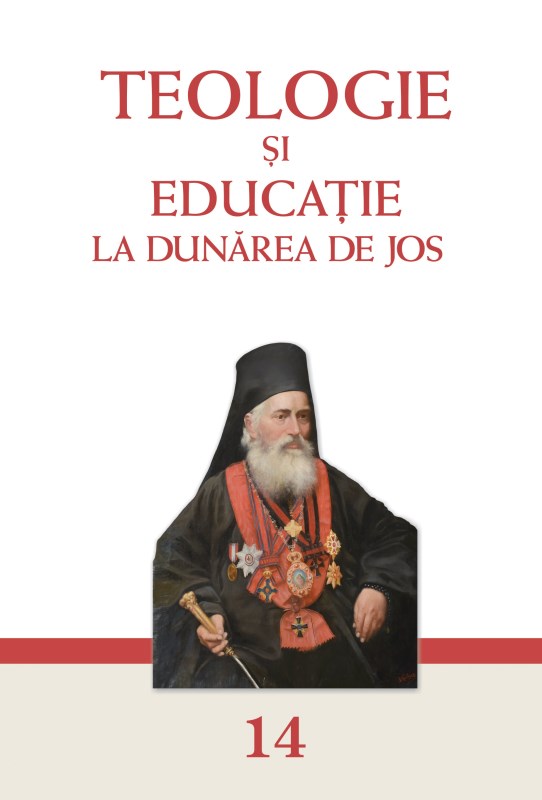
Keywords: Saint Basil the Great; education; Christians pedagogical ideas;
John Chrysostom (347-407), the most famous preacher in the East, is a bishop who exerted an important influence on the formation of family. The family has always been the place of the transmission of values, be it human, social, and religious. In his homilies he instructed fathers and mothers about their pedagogical tasks, and spoke of religious upbringing of children, which was directly linked with the well being of Christian family. His comments on the letters of St. Paul, his favourite biblical author, brought out the significant inspirations and ideas concerning topics connected with family and raising children.
More...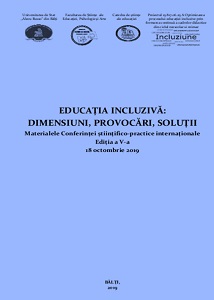
Keywords: health; locomotor difficulties; pedagogical conditions; interaction; environment
This article describes the pedagogical approaches for organizing work with children with locomotor difficulties in the institutions of early education. The factors that aggravate the correct keeping of the children are analyzed and the pedagogical conditions for preventing them are revealed by respecting the health in the group rooms.
More...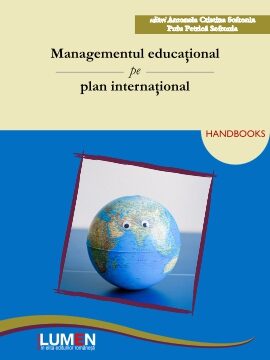
Keywords: Education; formal; nonformal; advantages; importance; developpment; skills; methods;
Formal education is considered the most important form of education. But there are two other forms that have their importance: the non-formal education and the informal education.Although non-formal education is similar in some ways to formal education, it is not given very much importance. But it is very important because, unlike formal education has different contents and forms of achievements which help students improve their skills and knowledge. That is why non-formal education is complementary to formal education and should be given much more importance.
More...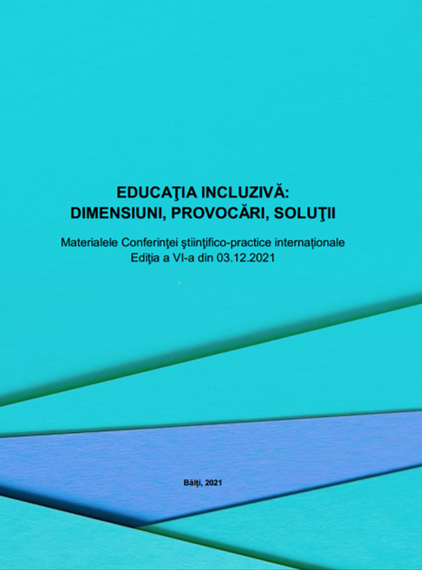
Keywords: Autistic spectrum disorders; autistic syndrome; copying; learning through modeling; chaining actions; ecolalia; psycho-pedagogical assistance; individualized educational program
The article discusses the aspects of educational support for children with autism spectrum disorders in the Resource Centre for Inclusive Education. The issues faced by children with autism and their families are also highlighted. The behavioural therapies most commonly used in working with the autistic child are described, as well as examples of improving pronunciation and speech development, developing thought operations, practising spatial and temporal orientation skills and educating civilised behaviour
More...
Keywords: intercultural education; non-formal education institution; children; young people; the right to education; pedagogical approach; intercultural skills; diversity
The article proposes a study on the intercultural education of children in the non-formal institutional framework, consisting of two distinct components, theoretical and practical. The analysis of the specialized literature and of the international documents, relevant to the investigated subject, is followed by the presentation of some educational approaches, good practices, taken from the activity of the Republican Center for Children and Youth ARTICO from Chisinau. The authors research the educational value of different types of activities and projects, pointing out the details of the process, but also noting the impact on key beneficiaries, children and young people involved
More...
Keywords: children with disabilities, family; disability; social services; equal opportunities
The analysis of the issue of children with disabilities and their families from the perspective of social services provided indicates the direct link between family care and the quality of social inclusion of children with disabilities. These families, going through the current problem-phenomena with the society, also go through the problems generated by the disability appeared in the family. Social services have an important place in the integration of people with disabilities. The basic idea in the activity of social services is to ensure the principle of equal opportunities, so that the person with disabilities benefits from the same living conditions as his peers. The purpose of social services is to improve the quality of life of people with special needs by creating quality alternative services, supporting the process of social integration of people with disabilities by changing the mentality of rejection manifested by society
More...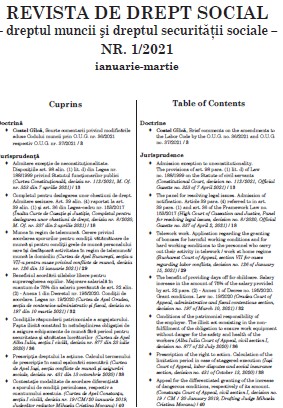
Keywords: telework; work from home; days off to supervise children; state of emergency; police officers;
În mod corect a concluzionat prima instanţă că, întrucât soţia reclamantului nu poate beneficia de drepturilereglementate de Legea nr. 19/2020, aceasta desfăşurându‑şi activitatea profesională prin muncă de la domiciliu sau telemuncă, nici reclamantul nu poate beneficia de majorarea salarială, situaţia celor doi părinţi neputând fi analizată individual. Critica recurentului în sensul că temeiul juridic al solicitărilor îl reprezintă Decretul nr.195/2020 şi nu Legea nr.19/2020, prin urmare, cerinţa reglementată de art.1 alin.(2) din acest ultim act normativ, referitoare la condiţionarea acordării sporului de faptul că locul de muncă al celuilalt părinte permite sau nu telemunca sau munca la domiciliu nu ar fi aplicabilă nu poate fi reţinută, de vreme ce chiar art.32 alin.2 din Decret prevede că ”personalul prevăzut la alin. (1) are dreptul la o majorare a salariului în cuantumul prevăzut la art. 3 alin. (1) din Legea nr. 19/2020, în situaţia în care celălalt părinte nu beneficiază de drepturile reglementate în această lege”.
More...Keywords: crisis situation; disability; assisted resilience; coping strategies; social services;
The number of children with disabilities is considerable and tends to increase alarmingly over the years. Through the appearance of the child's disability, the whole family system is disturbed, generating a crisis situation that can have negative effects upon it. Parents’ reactions are diverse; they adopt coping strategies due to several factors such as: intra-family relationships, the influence of the social environment, the social support they benefit from and their access to information. This paper presents the results of a qualitative research aiming at identifying main parental coping strategies, based on semi-structured interviews with mothers of children with various forms of disability. The findings uncovered certain shortage in the level of social services provided to people with disabilities. Each family is unique and adopts both adaptive and maladaptive strategies. However, through social work interventions in the form of assisted resilience, essential support is provided and maladaptive strategies can metamorphose into some adaptive ones.
More...Keywords: anxiety; child with handicaps; education; parenting; educational style
The problems of the families that educate children with disabilities have been attracting more and more attention over the last decades. Especially the relatioinships between the parents and the child and the educational style in such families are studied. Parent’s educational style is influenced by socio-cultural traditions; by the child’s clinical and psychological state; by the handicap’s ethology that influence the early contact between the child and the parents; especially mother; by the way the adults are communicating; and; most importantly; by the parent’s character. The relevance of the topic that is to be reported is created by the lack of research of the dependencies between the educational style and the parent’s anxiety; especially mother’s anxiety. The base hypothesis we verified: mother’s anxiety correlates with the chosen educational style. The research represents a comparative study with two groups of subjects: 30 mothers of children with disabilities – the experimental group; and a control group that consisted of 30 mothers with healthy children; both having completed 2 methods: 1) State-Trait Anxiety Inventory (STAI); 2) The Varga-Stolin method diagnosis of parental style. Three operational hypotheses were checked during the research. Hypothesis 1: Mothers of handicapped children have a higher anxiety level when compared to the mothers of healthy children. Even though the mothers of disabled children had a higher anxiety-state; the control group had a higher anxiety-trait; statistical comparison not showing considerable differences. The hypothesis was disproved. For both groups anxiety-state was low; anxiety-trait being moderately present in the experimental group and moderate to high in the control group. Hypothesis 2: There are different educational styles; depending on whether the child is handicapped or not. The analysis of the results showed that the control group had more pronounced attitudes of rejection; uncertainty and infantilization; and the experimental – the attitude of symbiosis; and almost equal when it came to the styles that involved cooperation and moderate control. One significant difference was spotted after the statistical analysis – that of the mean value for acceptance-rejection (p<0.02). The hypothesis was partially confirmed. Hypothesis 3. Anxiety directly corelates with educational styles that are not favorable for the child’s development and vice versa for those that are beneficial. To verify it we used the Pearson correlation test. The results showed: a) a negative relationship between anxiety-trait and educational attitudes of acceptance (p=0.05) and cooperation (p<0.05); which denotes the unfavorable role of anxiety in promoting mother-child parity relationships; a positive relationship between anxiety-trait and attitudes of control and infantilization; which illustrates the fact that fears; apprehensions; distrust ruin the child's ability to give autonomy; to treat him as an equal. Even though the reserch’s results are quite favourable; some problems with the relationship between a child with disabilities and their mother were found: the medical model being more prioritised rather than the social one; the informing of parents about the favourablee relationships and educational style being insufficient; the vulnerabilty of families and the stereotypical view upon handicaps; etc.
More...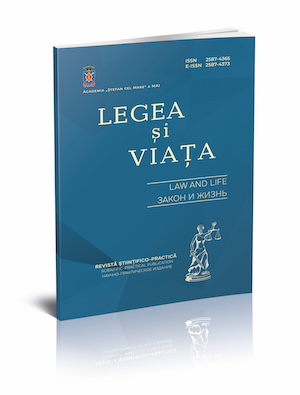
Keywords: children; rights; sentence; punishment; life imprisonment; life imprisonment without parole;
Life imprisonment is a custodial sentence that allows the state to keep the person in its custody for the entire life. The punishment of life imprisonment is of particular importance, as it is often the most severe criminal sanction in countries where the death penalty was abolished. From both a human rights and prison management perspective, life imprisonment raises concerns.In many legal systems there is an absolute prohibition on all life sentences for children, while 73 States around the world allowed people to be sentenced to life imprisonment for offences committed while under the age of eighteen.This article focuses on children younger than eighteen years convicted of crimes (as if the United Nations Convention on the Rights of the Child defines the notion of a child) and presents a comparative criminal law analysis of the regulation and enforcement of life imprisonment on children around the world. It also highlights the way that international, regional and national human rights mechanisms have addressed life imprisonment of children over the years.
More...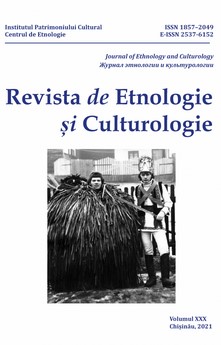
Keywords: orphaned children; orphanage; catering; Communist regime; Moldavian SSR;
In this article, we elucidate the problem of providing food products to orphanages in the Moldavian SSR in the years 1944–1947. The research found that the expansion of the orphanage network in the MSSR in the post-war years was due to the social policy of reducing the number of wandering and orphaned children suffering from hunger. The number of orphanages increased during the famine, and gradually decreased after its overcoming. The controls carried out by the authorities in the field of education and healthcare found serious gaps in the process of providing food to orphanages, irregularities in the management of products and even abuse of staff towards children. These realities aggravated the situation of children in orphanages, who were affected by the difficult family situation, famine and precarious conditions in institutions. Survivors’ testimonies show that most of the orphans who were taken to orphanages were rescued from starvation, and in some cases, when taken by relatives for maintenance, they died. The archive documents, but also the testimonies of the survivors show that the difficult situation of the children in the post-war years, the starvation, the vagrancy, the increase in the number of orphaned children, etc. were a consequence of the totalitarian politics and the irresponsibility of the local authorities.
More...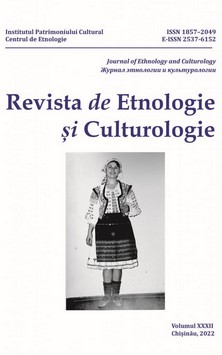
Keywords: Emotional intelligence; transnational families; children left at home; school environment;
The article provides a review of the specialized literature and addresses practices regarding the development of emotional intelligence in the school environment. In the current period, more and more families are involved in demanding, time-consuming activities or end up in a situation of separation, as a result of the phenomenon of labor migration abroad, the attention and parental supervision of children being affected. Transnational families are exposed to certain risks regarding the stability and balance of the emotional framework, the most vulnerable being the children. The socio-economic context reconfigures the families’ priorities, at the expense of emotional well-being, which leads to school adaptive difficulties and in the process of children’s mental development at a young school age. On a national and international level, these problems are generalized, a fact that involves the school in a process of emotional and social balancing of the child. The article highlights the impact that parental emigration has on school-aged children and the role of educational strategies in the development of emotional intelligence. The relationships established in the school environment between equals (students – students) but also the relationships established vertically (teachers – students) validate the emotional development of school-age children if they are optimized through adaptive strategies. The article provides a review of the specialized literature and addresses practices regarding the development of emotional intelligence in the school environment.
More...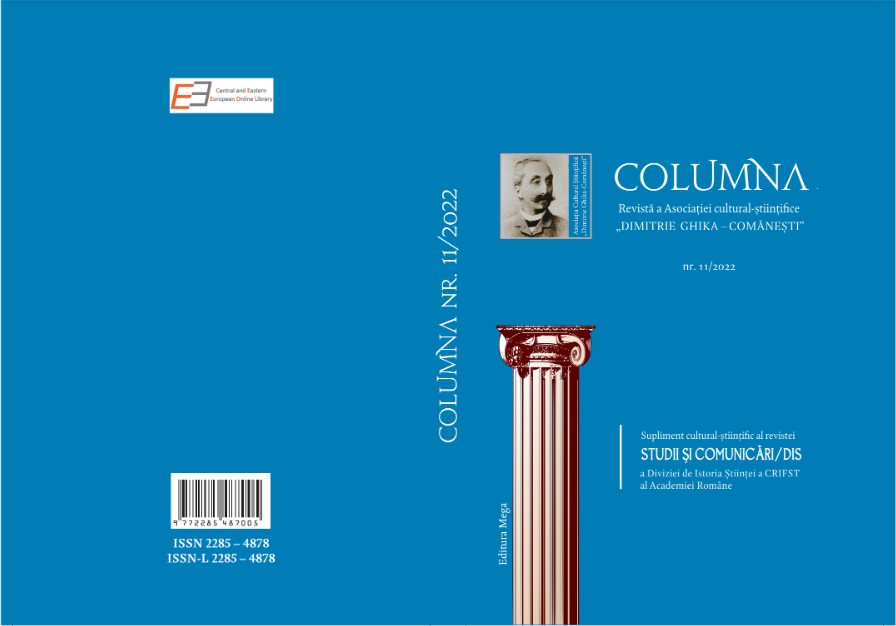
Keywords: migration; emotions; children; interaction; neglect
The departure of parents to get a better job can affect the psychological state of a child who may consider this event as being very stressful and traumatizing. The migration phenomenon is relatively new to our country. Migration is a social complex phenomenon that influences the entire society on all levels. Migration can trigger different causes of negligence for children which in turn can become abusive to the well being of child. Families find themselves locking certain abilities which would assure the proper development of child, thus affecting the child’s personality or his/ her capacities of adapting to society.
More...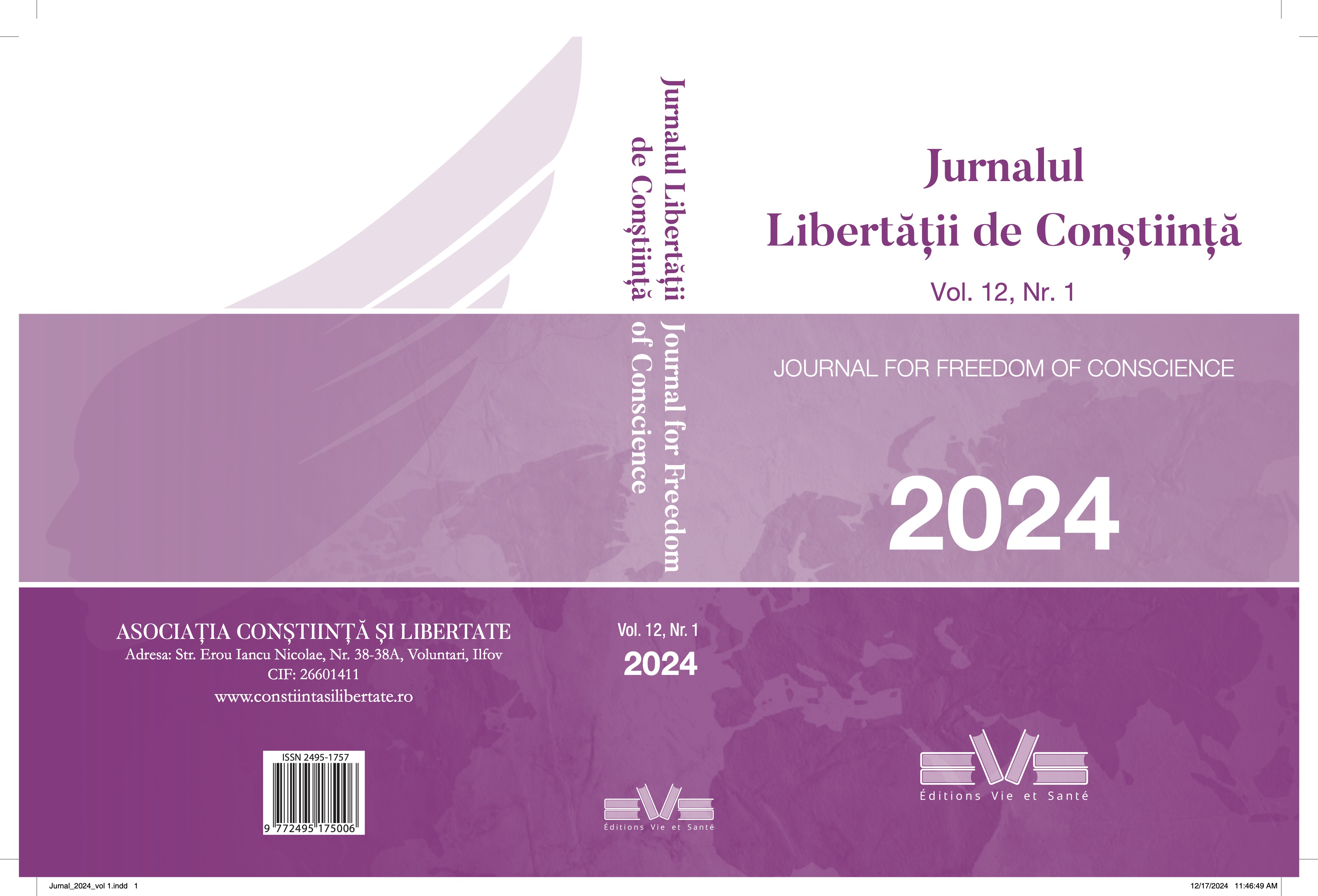
Keywords: discrimination; hate speech; prejudice; stigmatization; stereotyping;
Language is a key factor in shaping one’s own cultural perception and attitudes and beliefs about cultural groups - in short, in generating social stigmas. This fact is evident, among others, in the way we label the Roma by calling them “(h)arapină, aripată, balaoacheș, balaur, barabușter, baragladină, baraulă, borâtură, buzat, cataroi, cioară, ciocolată, cioran, cioroi, cioropină, cioropișniță, cocalar, colorat, corturar, faraon, gabor, garoi, geanău, jagardea, lebădar, maglaoi, magraon, mulatru,panteră neagră, rom, stăncuță, țigan, țigan de mătase, țigan de vatră, tuciuriu, zavragiu, or zburătoare”. The author analyzes the labels applied to the Roma in Romania from the perspective of their denotation and connotation in an attempt to identify the type of impact they can have on children and adolescents.
More...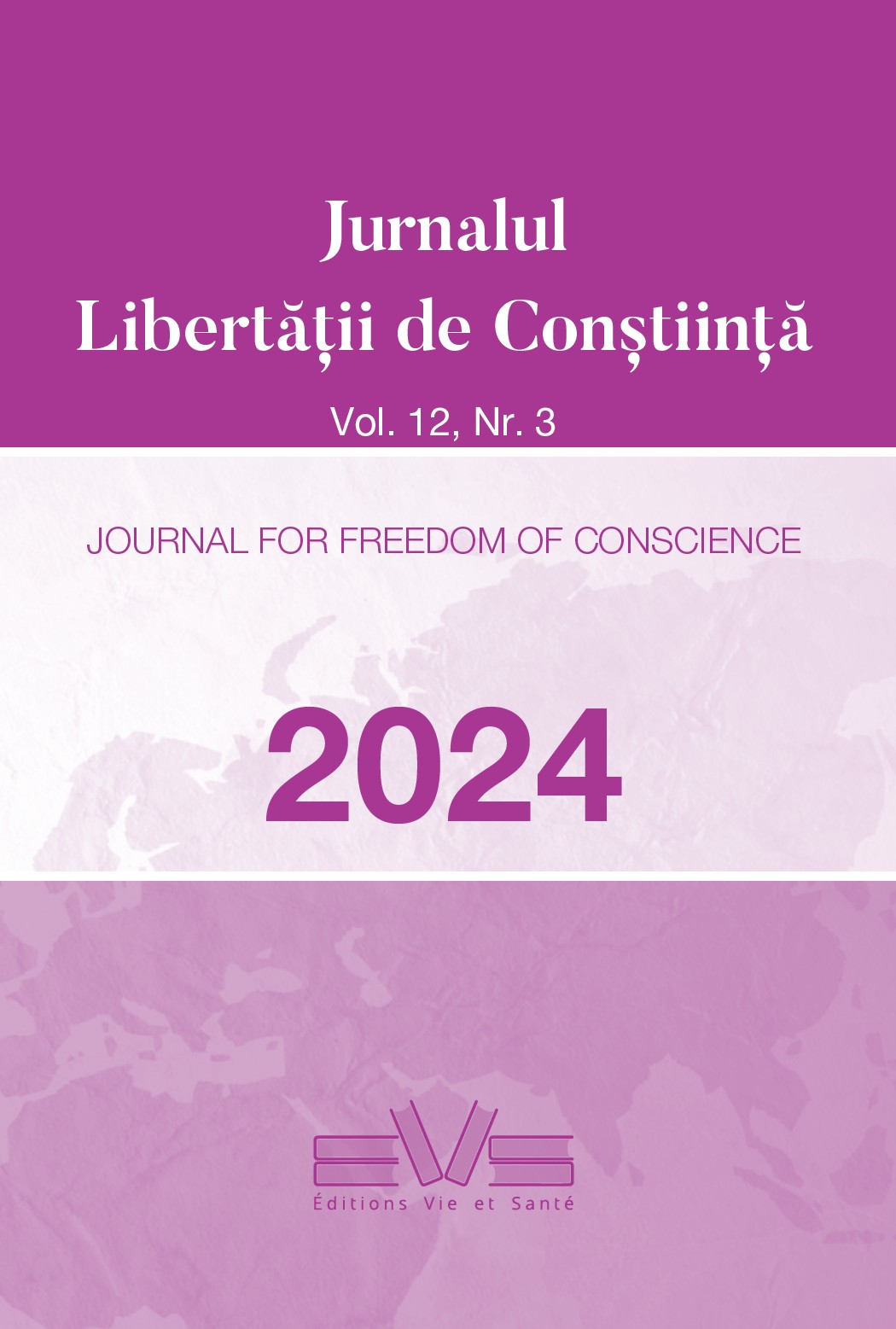
Keywords: Religious pluralism; values education; individualism; Kids Bible; Book of Job; curriculae; answers for children; teodicee; kindertheologie; suffering; healing; resilience; values;
In current religious pluralism and extreme individualism, it is imperative that religious education transmit the real and authentic values that form the future generations. Children need answers to their problems. The topic of suffering is one of them, because they have their own teodicee when dramatic events happen in their life. Sickness, loss of loved ones, poverty, lack of authentic relationships are just few of the problems that affect children and the mission of state and church is to help them overcome it. The trio coordination parent-teacher-pastor/priest I think is the most effective way that children understand their suffering and overcome it. For this purpose, story of Job is a unique tool for Children Bible and for school curriculum.
More...Keywords: Christ partaken to children; the education of the youth; catechetical work; religion; family; Church; school strategies of learning; paradigms;
The "Holy Cross" Social and Pastoral Centre of Caraiman Monastery in Prahova County took in, with the blessing of His Beatitude Father Daniel, Patriarch of Romania, between 28th and the 30th September 2021, the works of the 14th edition of the National Congress "Christ Partaken to Children''. The meeting of this year was dedicated to the intensification and growth of the quality and impact of the catechetical activities with the youth on the level of parishes. Proposals about the vision, mission, values and strategical directions of the Office for the Catechization of the Youth were presented for the period 2021-2025.
More...Keywords: pandemic; vulnerable children/ families; impact; social isolation;
This study aims to examine the consequences of the COVID-19 pandemic on children from vulnerable backgrounds. The pandemic has had a significant impact on vulnerable children and families, many of whom have been affected by school closures and lack of access to quality education. Vulnerable families also experienced difficulties in providing for their basic needs such as food and medical care. The objective of the study was to identify and explore the impact of the COVID-19 pandemic on children from vulnerable environments in the municipality of Oradea, the study participants being 12 parents of children who benefit from the services of a day care centre. The method used to collect the data was the interview-based survey. Through this approach, we wanted to analyze how these families were affected by the changes induced by the pandemic, focusing on the specific needs and difficulties of their children in a context of increased vulnerability. The results of the study highlight the difficulties encountered by both children and their families regarding the social isolation imposed during the pandemic. Also, the pandemic has generated significant changes in the emotional and mental plane of children, who experience fear in the context of the pandemic period. However, the parents made considerable efforts to be with the children, offering them support and encouraging them with the belief that this period will pass and that things will return to normal.
More...